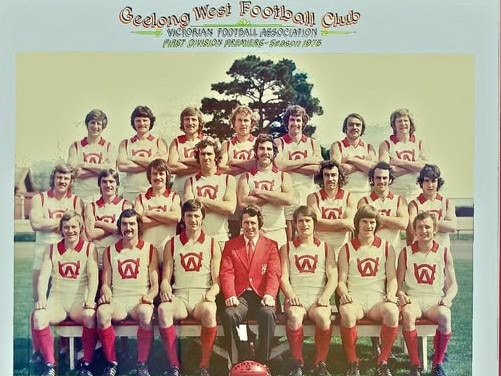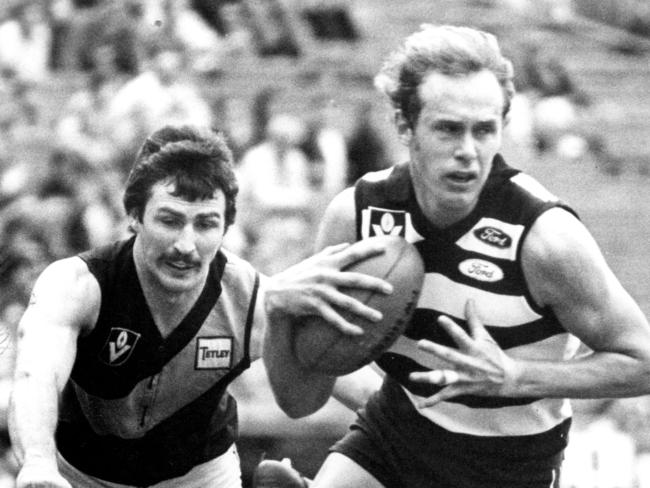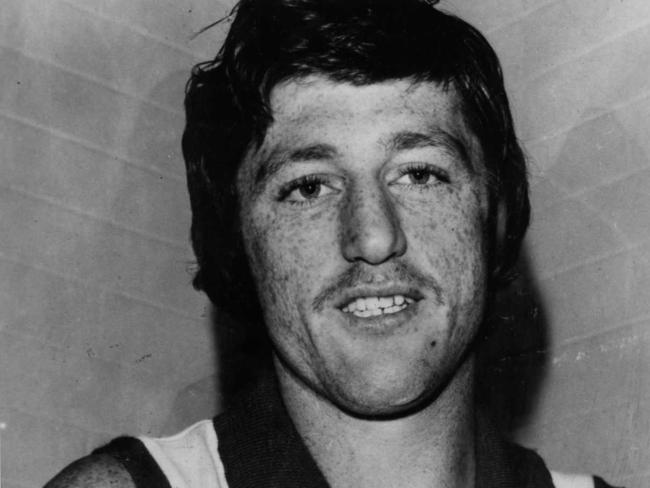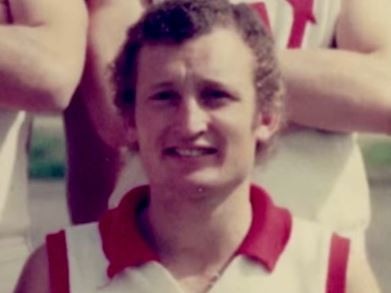Geelong West premiership players reflect on 1975 VFA premiership that was sparked by Cats legend Bill Goggin
A Geelong West side filled with Cats knocked off the best in Melbourne on its way to a VFA premiership in 1975. And the triumph paved the way for a Cats legend and a star to reach higher honours.

News
Don't miss out on the headlines from News. Followed categories will be added to My News.
Geelong West’s 1975 VFA premiership propelled an emerging coach and player into the big time.
AFL Hall of Fame member and Geelong legend Bill Goggin was the brains behind Geelong West’s flag 50 years ago, first getting the Roosters into division one after a division two triumph in 1972, and then luring a bunch of ex-Geelong players to the club.
The Geelong Team of the Century member was rewarded with a coaching job at the Footscray the very next year in 1976, before going on to coach the Cats from 1980-1982.
The successful Roosters side have shared a close bond over the past 50 years and on Saturday Geelong West Giants will honour its past by wearing the famous Roosters jumper in their home clash against St Albans and hosting a 1975 premiership reunion.
Geelong West premiership captain Peter Stephens and flag teammate Greg Wells, the brother of Cats recruiting mastermind Stephen, said Goggin was central to the Roosters’ triumph.

“We had a lot of time together because a lot of us left Geelong Footy Club in the same year. Billy Goggin inspired, ‘Let’s get together and really build something’,” Wells said.
“He knew he wanted to go to the league the next year, whether it be Bulldogs or Geelong, and It certainly did catapult him.
”Billy Goggin was smarter than the other coaches in the competition. Between a strategist and a psychologist, he had us all going.”
“Geelong let us all go and we were coached by one of the best coaches of all time in Billy Goggin,” Stephens recalls.
“The main reason we won that final was because of B Goggin. He was the mentor, he put it together, him and Robert Gannon.
“Billy was the best orator, and you couldn’t get into the rooms. Everyone wanted to get in. And we had fairly big rooms, there’d be a couple of hundred people in there listening to Billy talk and give us instructions.”

Then there was a youngster on the rise, Terry Bright, who was just 17-years-old when Geelong West knocked off Dandenong by 28-points in front of 27,000 fans at the Junction Oval.
Bright was picked up by Geelong the next year and would be coached by Goggin again five years later, finishing with 331 goals across his 219-game career.
The three-time Geelong leading goalkicker said his VFA baptism of fire helped him make the jump to the VFL.

“It certainly set me up and helped me enormously, playing against men at that young age certainly helped me and then the rest,” Bright said.
“(Goggin) was a really good coach and you always knew where you stood with Billy.
“He was good on the day and he got us over the line. He had a successful era at West and is still very passionate about the West era when you speak to him.”
The Geelong connections were endless, with the team featuring former players in Peter Stephens, Greg Wells, Joe Radojevic – who kicked 119 goals for the season and four in the grand final - Jeff Kline, Ivan Russell, Rod Stokes, Peter Stephens, Warwick Yates and John Hughes.

“The thing that we had that the rest of (the other teams) didn’t have was we’d all played together. We’d played together at Geelong for two or three years, and when he Billy got us all over there, we were all mates,” said Stephens, who has travelled from Port Macquarie for the event this Saturday.
“That was our secret, plus Billy of course. Billy was the ex-factor.”
GET AWAY WITH MURDER
Footy was different back in 1975.
Cold Victoria Bitter long necks littered the crowd from eskies brought into the ground and fights on the footy field were not only commonplace, they were encouraged.
And the VFA was renowned for the biff.
“They were competing with the VFL, the Association they were aligned with Channel 0 (now Channel 10), and everyone used to watch it and wait for the bloody thuggery,” Stephen said.
“Apart from not having wings, that was their point of difference. You could get away with murder – and they did!”

Wells and centre-half forward Stephens looked out for young Bright on grand final day, but the budding talent signalled his intent early in the contest.
“About five minutes into the game, he ran through a bloke. Terry was 17 and he ran through a bloke who had come from Hawthorn, ran straight through him,” Wells recalls.
“So we sort of though then, ‘Okay, we’re in the right place here’.”
Stephens and Wells both recall that Hughes copped a brutal head knock before halftime.
“Hughesy played on, but he didn’t know what day it was,” Stephens said.
It was Dandenong player John Walker who was the main offender in the 1975 grand final, with Roosters full back Howard Smith also copping a hit behind the play from VFA great Jim ‘Frosty’ Miller.
“I call the game ‘Johnny Walker’s Greatest Hits’ - he got me too,” Wells chuckled.
“Right near the end, I was on the ground with a mark or a free kick and he was on the mark. So as I’m getting up he said, ‘Hey, we’re still swapping jumpers aren’t we Wellesley?’ No hard feelings, just because I belted ya,” he added with a laugh.
While there is a lighthearted element to the barbaric nature of footy back then, a Geelong West premiership player who won’t be there on Saturday personifies the devastating consequences of the way the game was played during that period.
Concussion and its impact on the brain were not known at that time, and Alan ‘Dizzy’ Lynch suffered around 15 head knocks in his career before his tragic death from Parkinsons and dementia in October last year.
He was just 70.

Lynch played five VFL games for Footscray under Goggin in 1976 and another two for Richmond.
This publication reported last year that his family suspected he had CTE (chronic traumatic encephalopathy) and they donated his brain to the Australian Brain Bank.
Wells said the Roosters were shattered by the news of his death last year.
“We were all extremely disappointed and knew that he had gone too early,” Wells said.
“Nobody understoood the consequences then, so there is no blame to the trainers or the doctors or anything like that, but it is amazing how many people are suffering badly from (concussion).”
Tony Gilmore is the only other member of the premiership side to have died.
“Our better players (in the grand final), Tony and Dizzy Lynch, they have both departed now,” Stephens said. “They are the only two (players) that have died.”
WEST INSTITUTION
West Oval was an institution on Sundays when the Roosters were at home 70s, with the Roosters one of the most popular teams in town aside from the Cats.
With the VFA given clear air and pubs shut, crowds flocked to North Geelong to socialise.
“A lot of the local clubs used to go on a Sunday and watch because there’s no Sunday drinking then, so they’d have their barrels and come down to the ground on Sunday afternoon and watch Geelong West play at West Oval, which was the good days,” Bright said.
Geelong West was so big that roughly 30 bus loads of fans went up from Geelong to the Junction Oval for the 1975 grand final.
Roosters players had plenty of fun commuting up and back on the Princes Highway for away games.
“The bus trips on the way up and back were memorable. The different times when we drove, they were memorable too,” Wells said.
“I’ve got memories of on and off the field.”
Many of the players from the premiership season went their separate ways after 1975, but the memories and friendships have lasted a lifetime.
Originally published as Geelong West premiership players reflect on 1975 VFA premiership that was sparked by Cats legend Bill Goggin



